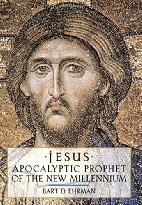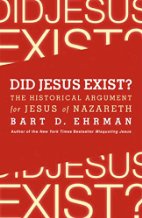 Richard Horsley on Bart Ehrman’s Jesus, apocalyptic prophet of the new millennium:
Richard Horsley on Bart Ehrman’s Jesus, apocalyptic prophet of the new millennium:
In a presentation intended for a wide audience, Bart Ehrman basically reverted to Schweitzer’s century-old picture of Jesus as a “Jewish apocalypticist.” . . . Ehrman either ignored or dismissed much of the scholarship [since Schweitzer]. . . .
Prophet Jesus and the Renewal of Israel, Kindle Version, pp. 25-26
Rafael Rodríguez on Bart Ehrman’s Jesus before the gospels: how the earliest Christians remembered, changed, and invented their stories of the Savior —
Ehrman too often relies on insinuation and unanswered rapid-fire rhetorical questions that are framed so as to make disagreeing positions seem unreasonable, when often enough the questions themselves are problematic (e.g., pp. 24–25). This . . . is usually a sign that [an] argument is not as clear or as precise as [one] would like it to be. “You don’t really think such-and-such, do you?” is not a helpful historical argument, even if it is often effective, and Ehrman retreats to this rhetorical device too often.
More problematic, in my view, is Ehrman’s dependence on sources. He reveals to his readers that, “[f]or about two years now I have spent virtually all my free time doing nothing but reading about memory” (p. 2), but his citation of memory studies seems to me rather anemic. . . . The majority of [memory studies he does cite] he cites only once, and on more than one occasion those citations are misleading (e.g., he cites Schwartz’s approbation of Maurice Halbwachs’s claim that memory adapts the past to “the beliefs and spiritual needs the present” [p. 7, citing Schwartz, Abraham Lincoln and the Forge of National Memory, 5] without mentioning that Schwartz also critiques Halbwachs on this very point . . . Perhaps even more problematically still, Ehrman engages almost none of the New Testament scholarship concerned with memory. . . . There’s no mention of scholars such as Chris Keith, Alan Kirk, Anthony Le Donne, Tom Thatcher, Michael Thate, or myself. (Chris Keith is mentioned in the acknowledgements, but none of his works appear in the endnotes.) When he mentions Dale Allison, Richard Horsely (sic), or Werner Kelber, he does not address their engagement with memory studies. This is especially worrisome when Ehrman complains that New Testament scholars, as a group, have largely ignored memory studies. When Ehrman does engage media studies among New Testament scholars, he draws attention to the form critics, whose work is largely seen as out-of-date. . . . .
I do not think he has accurately grasped even the current state of memory and the New Testament.
Jesus before the Gospels: a serial review (pt. 8)
 Bradley Bowen reviewing Did Jesus Exist? The Historical Argument for Jesus of Nazareth
Bradley Bowen reviewing Did Jesus Exist? The Historical Argument for Jesus of Nazareth
. . . Ehrman has presented a FACT FREE argument for the existence of Jesus, which is completely contrary to his claim that he thinks “evidence matters” and completely contrary to his goal to pursue the historical question of whether Jesus exists “with all the rigor that it deserves and requires”. Ehrman promised devotion to evidence and he promised scholarly rigor, but what he delivered is pure BULLSHIT, at least with his argument concerning Agreements Between Seven Indendent Gospels. . .
If you enjoyed this post, please consider donating to Vridar. Thanks!

“Ehrman either ignored or dismissed much of the scholarship [since Schweitzer].”
But… Schweitzer’s general thesis (that Jesus and the early church were expecting a soon coming Son of Man or Lord), is defended today by more than just Ehrman. So why is this considered much of a diss? James D. G. Dunn admits the historical Jesus probably made falsifiable predictions about a soon coming Son of Man; and Allison defends the apocalyptic Jesus view, pointing out how it is found in Paul, Mark, Matthew/Q.
It is undeniable that Jesus was an apocalyptic prophet, the problem is to consider him as a historical figure.
Jesus is an allegorical character, as Serapis or Dionysus, born from the evolution of astrotheology following the discovery of the passage of the sun from the Age of Pisces to the Age of Aries.
From the Age of Aries to the Age of Pisces.
By this theology millenarianism myths and new age were born.
Horsley does not address Dunn’s case but does praise Allison’s arguments for being a genuinely scholarly treatment of the topic. Horsley’s point is that Ehrman is slapdash and misleading/unscholarly in his presentation of the case for an apocalyptic Jesus.
Ehrman strikes me as having degenerated into little more than a hack. Like the paperback writer who has found a money-making formula he keeps churning out the same old stuff, over and over, each time with a new catch taken from the fad interest of the day — inflating his undeserved reputation for actually bringing the results of scholarship to a popular audience.
I know that paperback writer! He found his formula in his series on an alternative history from the Wars Between the States (American Civil War) to the Second World War. The name? Harry Turtledove. He’s been cranking the same thing out ever since. :^p
Pity Ehrman’s stooped that low.
Or Hal Lindsey, “Evangelist” hack. Playing on the apocalyptic fears of 80’s teens.The Beatles “Paperback writer” playing in the background!
Ad hominem arguments are lazy, hack and slapdash don’t give a counter argument that one can weigh their views against. Listen to both sides and decide which is more plausible.
Ehrman misremembers Halbwachs…quite a caption.
It seems that the scholars fear the Muslim denial of a crucified Jesus more than Mythicism himself:
http://www.academia.edu/2506607/Przemys%C5%82aw_Turek_Crucifixion_of_Jesus_Historical_Fact_Christian_Faith_and_Islamic_Denial
HI Giuseppe!
One can argue from the TF (Antiquities 18.63-64 (18.3.3) that Jesus *wasn’t* crucified, if one can swallow what I consider to be an obvious forgery, but rather managed to *evade* crucifixion, and was sighted or showed up three days later with a new lease on life. Metaphorically speaking, of course, which the LSJ and Middle Liddell lexica support.
LSJ defined:
https://danielbwallace.com/2014/06/30/lsjs-greek-english-lexicon-in-logos-bible-software-a-review/